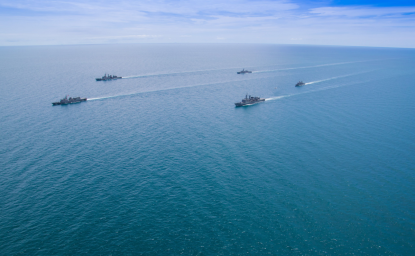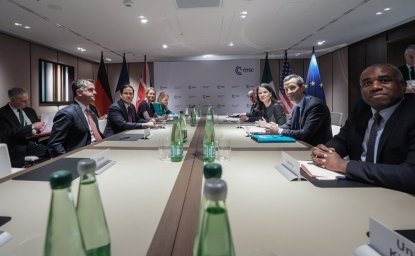
WASHINGTON – In a world seemingly mired in disinformation and the minutiae of partisan politics, much of the public’s attention is taken up by what we are against—however “we” is defined.
“As new and returning governments take shape after a year of historic elections where half of the world’s democracies went to the polls, we at the WQ think it’s important to have a conversation about what we are for,” said Stephanie Bowen, editor of the Wilson Quarterly. “Thus, we turned to some of the world’s most respected global leaders and foreign policy thinkers to share the narratives that have helped guide them and the world through past times of challenge, and which can inspire us as we seek a brighter, more peaceful and prosperous future.”
With topics ranging from technology, democracy, human rights, and foreign policy approaches to pivotal countries and regions, these are the narratives they believe we should embrace in the months and years ahead.
In this issue:
Editor’s Note: Curating a Conversation About What We Are For. In this introduction to the issue, WQ Editor Stephanie Bowen provides context to the issue and details its contents.
Change in Russia Will Come Suddenly—And We Must Be Ready. Russian dissident and journalist Vladimir Kara-Murza reflects on Russia’s turbulent political history and argues that major change will come unexpectedly, as it has in the past. He calls on the West to prepare for the sudden shifts that are likely to occur as Putin’s regime falters, offering a path for Russia’s democratic transition and integration into the international community.
Bridging Awe and Algorithm. Tech innovator Corey Jaskolski reflects on the power of technology to connect and inspire while addressing its potential risks. From digitizing sacred spaces to advancements in artificial intelligence, Jaskolski writes about the importance of collaboration—between humans and machines—in shaping a brighter future.
One Mountain, Two Tigers. Director of the Wilson Center’s Kissinger Institute on China and the United States Robert Daly, examines the growing competition between the United States and China. He explores the political and economic logic driving their rivalry and argues for a strategy rooted in stability and mutual restraint to avoid conflict and foster coexistence.
Finding America's Diplomatic Compass in the Middle East. Ambassador Michael Oren writes on the intense polarization shaping America’s foreign policy. He argues for a balanced approach that avoids extremes, emphasizes diplomacy as a tool for achieving peace, and reclaims America’s legacy as a global leader.
The First Amendment is First for a Reason. Drawing on examples from across the political spectrum and throughout history, veteran New York Times reporter David Sanger writes about the importance of a free and fair press in supporting a vibrant democracy.
Human Rights as Part of Foreign Policy. Noted human rights activist Natan Sharansky expresses the importance of embedding human rights into foreign policy. Drawing on historical examples, including the Cold War and the Arab Spring, he illustrates how democratic governments can support freedom fighters, foster international stability, and uphold the universal desire for freedom.
A Strategy for Global Prosperity. Former World Bank President David Malpass argues that US leadership is vital for fostering a stronger global economy and advancing peace through strength. He critiques the erosion of US influence in global institutions and highlights the need for a strategy rooted in economic growth, military strength, and decentralized governance to counter authoritarian regimes and global inequality.
Why America’s Future Prosperity Flows Through the Indo-Pacific. With the backdrop of US-China competition and the region’s growing influence on trade and technology, former Indian Foreign Secretary and former Indian Ambassador to Washington and Beijing Nirupama Rao writes about the crucial role of the Indo-Pacific in securing America’s future prosperity.
In Support of Democracy. Longtime leaders of the National Democratic Institute Frank Fahrenkopf and Kenneth Wollack discuss the importance of promoting democracy worldwide. Reflecting on Ronald Reagan’s 1982 Westminster speech, they explore how advancing democratic governance aligns with American values and interests in today’s interconnected world.
An American Approach to Foreign Assistance. Ambassador Mark A. Green reflects on his time as USAID administrator and introduces the “Journey to Self-Reliance,” a policy framework rooted in empowering communities and countries to achieve independence. Drawing on personal experiences in rural Kenya, Green writes about the importance of providing opportunities instead of handouts.
A Continent of Consequence. Tanzanian businessman Mo Dewji makes the case that Africa is uniquely positioned to influence the global economy, drive innovation, and manage resources in ways the world cannot overlook, and that our human future is inextricably linked to Africa’s success.
Can Latin America Be Great? Former Colombian President Iván Duque Márquez argues that the United States cannot “Make America Great Again” without fostering a stronger, more prosperous Latin America. He provides a five-pillar strategy focused on promoting democracy, combating crime, advancing near-shoring, strengthening hemispheric institutions, and leveraging Hispanic heritage to create an integrated and thriving region.
What Does it Mean to be European? Baroness Catherine Ashton explores the evolving concept of European identity in the post-Brexit era. She reflects on Britain’s historical relationship with Europe, the impact of leaving the EU, and what it truly means to be “European” in the 21st century.
Notes to editors:
- The Wilson Quarterly, one of the nation’s premier journals since 1976, offers fresh takes, on-the-ground reporting, and thought-provoking perspectives through carefully curated articles and multimedia pieces. A unique narrative publication to emerge from the Washington think tank world, each issue takes a deep dive into a single topic or theme shaping our reality. The publication became digital-only in 2012. The views expressed are not necessarily those of the Wilson Center.
- The Wilson Center provides a strictly nonpartisan space for the worlds of policymaking and scholarship to interact. By conducting relevant and timely research and promoting dialogue from all perspectives, it works to address the critical current and emerging challenges confronting the United States and the world.
Explore More
Browse Insights & Analysis
Southeast Asia Maritime Security and Indo-Pacific Strategic Competition

A World Ready for Realignment?

